
Transcription
Date: 16 Jun 25
Subject: Hey Alberto,
First, let me just say thanks for transcribing my letter. I remember when I first hooked up with this I had to print all my stories by hand, and so I was very appreciative of people like yourself.
However, when our prison system gave us these tablets for communication I thought I would no longer need to have my messages transcribed. But apparently it has something to do with the difference in the layout system of each persons computer. That's why I no longer include footnotes at the bottom of my pages. From what I've been told they don't end up at the bottom of the page like I had designed them to when I type them on my tablet.
So, seeing that you're all the way over in Italy, what drew your attention to looking up about prisoners over here in the U.S. A ? If I'm not mistaken, back a few years ago thad a reader who was from Afghanistan. But the only reason he was on the internet looking up prisons was because his date for that evening had called at the last second to cancel their plans. So he was just passing the time away, doing some comparing of what the prisons were like between the two countries. Hopefully your date didn't stand you up.
Your mention of the Italian culture made three things immediately come to mind. Sports cars, fabulous food, and astronomy scientists.
Back when I was 13, I fell in love with an exotic sports car known as a Lamborghini Countach. I swore that one day I would have one, however, I'm quite sure that my present address will make that an impossibility.
Being able to eat fabulous Italianate food is another thing I'm missing out on while in here. Whether you want to believe it or not, prison can actually make Italian food that does not taste good. I never thought that would be possible. I guess my weight can pretty much prove that though. When I came to this camp I weighed 163 pounds - I now weigh only 138.
I've always had an interest in the science of astronomy, and fortunately I have a pen pal in California who is going to school to be an astrophysicist. The timing of YOUR letter and HIS last one was quite a coincidence, because he and I were discussing how the Italian scientist Galileo was the first man to use the telescope for studying the stars. He had sent me a diagram that had the scale drawings of about 25 different telescopes in comparison to a human being, and some in comparison to a basketball court. They're really making those things big now.
Well, I don't want to waste too much of your time, so i'll cut it off there. Thanks again for the help and message, and I hope you enjoy the remainder of my stories.
MAZE.
Other posts by this author
|
2026 feb 11
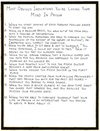
|
2025 dec 4
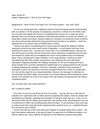
|
2025 dec 2
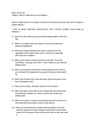
|
2025 dec 1
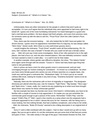
|
2025 nov 30
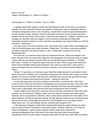
|
2025 nov 29
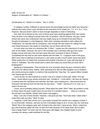
|
More... |
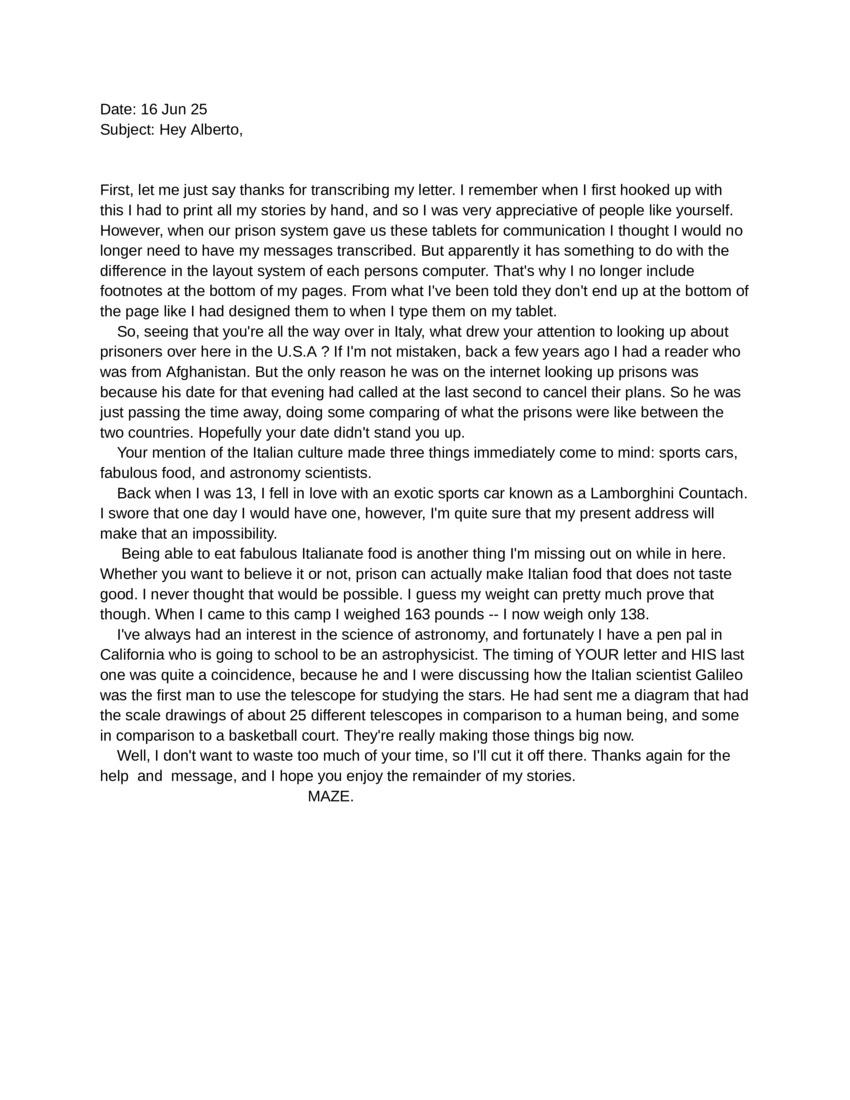

Replies (1)
I'm glad I got your response. I'm interested in corresponding with a prisoner because I think it might give him some relief. I think it could be for both of us nice for both of us to talk to a person who live in another country and continent.
I am happy to hear that you like Italian food which is internationally considered one of the best in the world.
Lamborghini is one of the most beautiful sport cars in Italy, only rich people can afford to buy one.
Today I would like to talk to you about the scientist Galileo Galilei, since you told me that you talked to your pen pal. Galileo was born in Pisa in 1564 and began studying medicine at the University of his city in 1580, before choosing to specialize in mathematics in 1583. Galileo remained in Pisa until 1585, where he also studied physics and where he made his first discovery: it is said that by observing the lamp on the ceiling of the Pisa Cathedral he discovered the isochronism of the pendulum's oscillations. From 1589 he taught in Pisa and in 1592 he was called to the University of Padua, where he was a professor until 1610.
In his studio in Padua, Galileo created a small workshop in which he performed experiments and manufactured instruments that he sold to supplement his salary. Here, in 1593, he invented the machine for raising water to higher levels, which was used in Venice. Between 1604 and 1609, he built and perfected the telescope, an instrument invented in Holland, which Galileo used for the first time to observe the stars. He acquired precise information on the surface of the moon, establishing that it had irregularities. He studied the Milky Way, which turned out to be a set of very distant stars, which expanded the boundaries of the universe. He discovered the four largest satellites of Jupiter, observing that planets can also have satellites. Galileo Galilei adhered to Kepler's ideas on the movements of the planets, including the one according to which the Earth rotated on itself. He also supported the heliocentric theory enunciated in 1543 by the astronomer Nicolaus Copernicus, according to which the Sun, but not the Earth, was at the centre of the system with the planets revolving around it in a revolutionary motion.
In 1633 the Inquisition called and the trial began during which Galileo tried to explain, without success, his reasons to the Church, which did not accept the idea that the earth revolved around the sun because it contradicted what was written in the Bible. On June 22, 1633 he abjured his theories, with which he disavowed the discoveries made and the Copernican theory, and was condemned to exile in Arcetri, where he died in 1642.
Best regards.
Alberto (Italy).